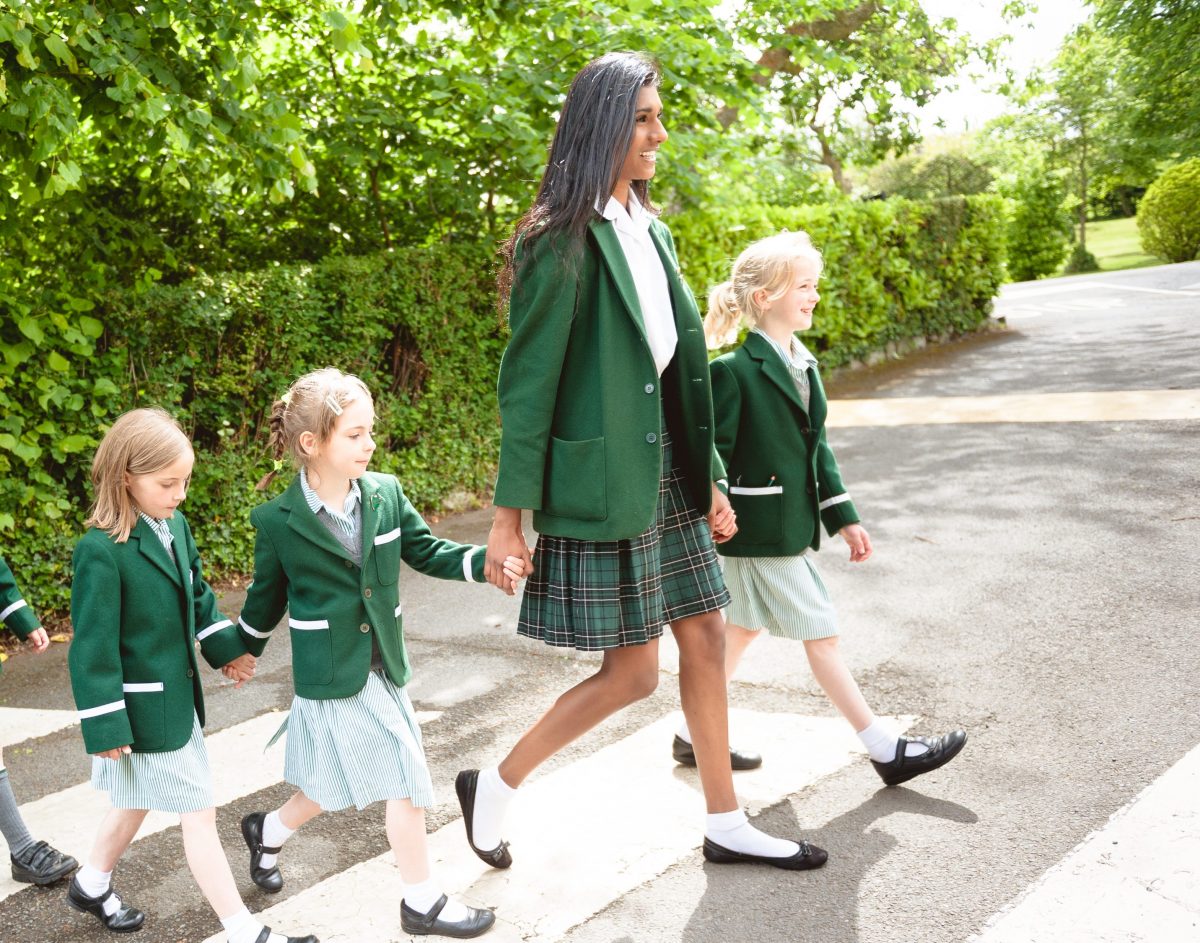Gender agenda no barrier to Leadership ambition for Round Square students
Posted: 21 April 2021

A recent survey of students across Round Square’s international community of schoolsfound that 80% of respondents could see themselves working in a leadership role in the future.
This will come as welcome news for our Member Schools, whose focus on Leadership, as one of the six Round Square IDEALS, aims to impact positively on students’ confidence, attitudes and ambitions alongside broader development of leadership skills.
Even more encouraging is the split between male and female respondents.
With 79% of boys and 81% of girls considering themselves to be potential future leaders, the survey results point to a broad equality in students’ ambitions for leadership, regardless of gender.
This is backed-up by the results of a 2016 research study conducted across the Round Square global network by researchers from the Cambridge University Faculty of Education which identified the capacity for Round Square schools to develop in their students a set of values that overcome gender and cultural conditioning.
As the researchers explain in their report, “Whilst one might anticipate that in some countries there might be a cultural bias against, for example, girls seeing ‘leadership’ or ‘adventure’ as less important to them or their school, there is no such pattern anywhere in the data.” The report goes on to say that, “simply put, this suggests that Round Square students and teachers, on the whole, do not feel or act as if limited in any way by their gender”.
To understand why this is important, you only need turn to the World Economic Forum’s latest Global Gender Gap Report, published in November 2017. The report sets out what it describes as “a clear values-based case for promoting gender parity”, beginning with a common-sense argument that, “women are one-half of the world’s population and deserve equal access to health, education, economic participation and earning potential, and political decision-making power”.
The report goes on to highlight that gender parity is fundamental to whether and how economies and societies thrive. It outlines a correlation between increased gender equality and increased annual GDP growth rates, and explains that: “increased gender parity in education lowers infant and child mortality rates, lowers maternal mortality rates, increases labour force participation rates and earnings, and fosters further educational investment”.
The report also highlights that: “women’s engagement in public life has a positive impact on inequality across society at large. The issues that women advocate, prioritize and invest in have broad societal implications, touching on family life, education and health”.
This is a topic close-to-the-heart for an increasing number of Round Square Alumni, whose life-paths have taken them into leadership positions in later life that support and campaign for gender equality.
“We are all human beings – with our own unique skills and talents,” says Sanam Naraghi-Anderlini, a former pupil of Round Square School, Cobham Hall, and Founder and Executive-Director of a US-based NGO, ICAN (International Civil Society Action Network), an organisation that promotes women’s rights, peace and security.
“No family, community, country – nor the world – can afford to miss out on 50% of this talent pool whether they are boys or girls,” she says. “But to have true parity, equality and respect, we need to ensure that we teach the history of each topic with attention to the men and women involved in it, and attention to how men, women, boys and girls were affected by events”.
Sanam worked with women from around the world to put a “human face on the subject of war” when she petitioned the United Nations to consider the plight of women in war-torn countries. Her collaborative political activism resulted in a ground-breaking UN Security Council resolution (Number 1325) mandating countries to involve women in conflict resolution. Now an influential advisor to governments and international bodies, she publishes extensively on the subject of women, war and peace, and campaigns for greater understanding of women’s role as “the frontline humanitarians, mediators and even weapons collectors and ceasefire monitors… the peace actors”.
Stories like Sanam’s are a source of inspiration to students in Round Square schools throughout the world who are encouraged not only to view themselves as potential future leaders, regardless of gender, but also to understand that in this position they have the capacity to act on their convictions and make a positive difference in the world.
Another example is set by Nimet Rener, a former pupil of Round Square school, Gordonstoun and now Director of the Aga Khan Education Services, an agency of the Aga Khan Development Network that works to improve living conditions and opportunities for people in some of the poorest parts of the developing world.
“It seems difficult to imagine how any society can thrive and advance to its full potential if half of its citizens are denied the basic right to education and the opportunity to become fully contributing citizens”, she says. “Even when there is gender parity in education, the quality of that education is critical. If it can be underpinned by a respect for the value of pluralism, the recognition and appreciation that diversity is a strength and necessity for the future evolution of humanity, then gender differences would be harnessed, valued and respected. The question of gender parity would then not even arise. That would be my hope”.
The Aga Khan Education Services operates over 200 not-for-profit schools and programmes from pre-primary to secondary, predominantly in rural areas, across 12 countries in East Africa, Central and South-East Asia. The schools and programmes supported by the agency seek to ensure that young children have access to a quality education, placing emphasis on early childhood education and ensuring access for girls. The value of pluralism and service underpin the programmes offered at the schools.
As two examples of Round Square School Alumni that have acted on their desire to make a positive difference in the world, both Sanam and Nimet have built on the foundations for successful leadership instilled in them through their education.
Arriving for the first time at Gordonstoun in the early 1980s, Nimet describes herself as a ‘very average young girl’: “I didn’t have a clear idea of what I might do. There was an assumption at home that I would get married, have children and be a homemaker. There were no high articulated expectations from my parents that I should follow a specific career. There was much encouragement to do what felt right.”
One of the first intake of female students at Gordonstoun, Nimet found herself in an environment which was “infused with Round Square values“, where “girls were encouraged to seek new opportunities and experiences in equal measure with their male counterparts“.
She says: “Having opportunities to take leadership roles at the school helped me understand that leadership isn’t necessarily about being the first or necessarily the best, but being the one who can bring people together as a team to work towards a shared goal or purpose. I started to learn that Leadership isn’t about making yourself the priority, it’s about representing your team members. Over time I have come to realise that leadership at its core is about stewardship and service“.
Sanam Naraghi-Anderlini recalls that her Round Square experiences at Cobham Hall: “instilled in me a respect and wider appreciation for people with different skillsets and abilities in my team. As a leader, you’ve got to show that you are enjoying what you do to inspire others to give their all. Success is rarely down to the achievement of one individual and success is often magnified when you inspire others to take ownership”.
Teamwork as a key component of successful leadership is widely recognised in Round Square schools and is one of the 12 Discoveries that make up the Round Square Discovery Framework for Teaching and Learning. In December’s student survey, both male and female respondents included Teamwork and Communication skills in their top three qualities for leadership. For male respondents, the most important quality was decision-making, and the female respondents’ top three instead included Compassion.
“As a leader, I seek to cultivate a compassionate heart”, says Nimet Rener. “This is an ongoing journey and requires a daily commitment. When open-hearted, I am able to draw information from and consider the rational objective aspects of decision making and also draw on the information provided by my heart and my intuition. A compassionate disposition enables non-judgemental listening and understanding which I believe leads to better decision making. If a leader’s role is to ensure the success of his or her team, then compassion and well-wishing is an essential starting point”.
Sanam Naraghi-Anderlini also rates “compassion, empathy and I would say, imagination” as being key to the work of a peacebuilder or peace strategist.
“In the years I’ve been involved in peace work, I have found that we have a cycle of inspiration and learning that continues to grow”, she says. “I learn from my partners and am in awe of them. They in turn are kind enough to value my insight and ideas. We have to be able to see the world standing in the shoes of ‘the other’. It is not always easy and there are times that it can feel like it hampers or complicates moving forward towards a vision. But leadership without compassion is diminishing our humanity and that of those we hope to represent”.
With Compassion ranked so highly in our survey by female students, it is perhaps unsurprising that of only six industries in which the proportion of employed women exceeds 50%, the World Economic Forum’s 2017 Gender Gap Report identifies the non-profit sector as “the only one currently trending towards full parity” in appointing women to leadership positions.
